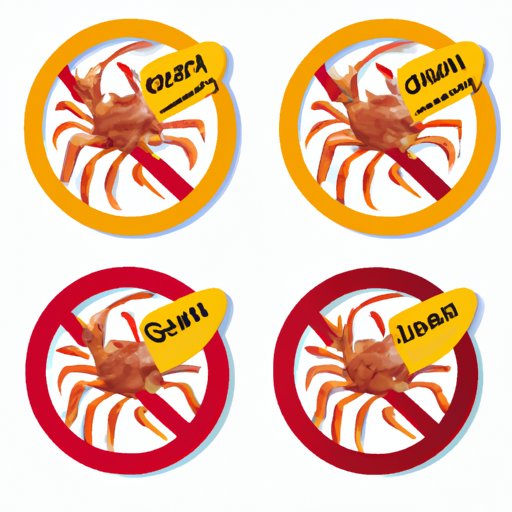
Is Imitation Crab Gluten-Free?
Gluten-free diets have become increasingly popular in recent years, with more people choosing to eliminate gluten from their meals. Gluten, a protein found in grains such as wheat, barley, and rye, can cause digestive issues for some people. However, avoiding gluten can be challenging when it comes to certain types of food, such as seafood. One of the most popular seafood choices is imitation crab meat, but is it gluten-free? In this article, we will explore the gluten-free status of imitation crab meat and provide information on safe seafood options for those avoiding gluten.
Is Imitation Crab a Gluten-Free Option for Seafood Lovers?
Before we dive into the gluten-free status of imitation crab meat, it’s essential to understand what gluten-free means. A food item can be labeled gluten-free if it contains less than 20 parts per million (ppm) of gluten. This standard has been set by the U.S. Food and Drug Administration (FDA) and is considered safe for most people with gluten sensitivities.
Imitation crab meat is made from a mixture of minced fish (usually pollock or another white fish) and various other ingredients such as starch, egg whites, and sugar. The mixture is shaped to resemble crab meat and flavored with crab extract or a similar flavoring. While the primary ingredient in imitation crab is fish, it’s essential to look at the other ingredients to determine if it’s gluten-free.
Some of the ingredients that are added to imitation crab meat can include gluten, such as wheat flour or soy sauce, which often contains wheat. However, there are gluten-free options available, and many manufacturers label their products as such.
Gluten-Free Eating: Is Imitation Crab Meat a Safe Choice?
If you’re avoiding gluten and considering imitation crab meat, there are a few things to keep in mind to ensure it’s safe for you to eat. First, read the labels carefully to identify any gluten-containing ingredients. Even small amounts of gluten can cause issues for those with sensitivities. Secondly, make sure that the product is not prepared in an environment where cross-contamination is possible.
Cross-contamination occurs when a gluten-free product comes into contact with gluten-containing products or surfaces. For example, if imitation crab meat is prepared on a surface that also was used to prepare bread, it could be contaminated with gluten. It’s essential to ask the manufacturer or restaurant about the preparation process to avoid any potential cross-contamination issues.
There are safe seafood options for those avoiding gluten, including fresh fish, shrimp, and lobster. These options are naturally gluten-free, making them a great choice for those with sensitivities.
Understanding Gluten-Free Imitation Crab: What You Need to Know
Imitation crab meat is a popular seafood option, but it’s essential to understand its gluten-free status before making it a part of your diet. While some brands are labeled as gluten-free, others may contain gluten-containing ingredients such as wheat starch or soy sauce.
It’s also important to understand the preparation process and cross-contamination concerns. If you’re unsure about the gluten-free status of imitation crab meat, it’s always best to speak with the manufacturer or restaurant for clarification.
Is it Safe to Eat Imitation Crab if You’re Avoiding Gluten?
Reading food labels carefully can help you identify whether imitation crab meat is safe for you to eat. Look for products labeled as gluten-free, and avoid any products that contain wheat, barley, or rye. It’s also a good idea to research the brand to ensure that they are committed to producing gluten-free products.
Some brands that produce gluten-free imitation crab meat include Trans-Ocean, Seaquest, and Louis Kemp. These brands are certified gluten-free and can be a safe option for those avoiding gluten.
When it comes to preparing and cooking gluten-free imitation crab meat, it’s important to use separate cooking utensils and surfaces to avoid cross-contamination. It’s also recommended to cook the imitation crab meat thoroughly to ensure it’s safe to eat.
Imitation Crab and Gluten-Free: What You Need to Know About This Popular Seafood
Imitation crab meat is a popular seafood option due to its taste, texture, and versatility. It’s used in a variety of dishes, including salads, sushi rolls, and crab cakes. However, for those avoiding gluten, it’s essential to understand the gluten-free status of imitation crab meat.
While imitation crab meat can be made with gluten-containing ingredients, there are many gluten-free options available. It’s essential to read the labels carefully and ensure that the product is not prepared on surfaces or equipment that may have come into contact with gluten-containing products.
For those who cannot consume gluten, there are plenty of safe seafood options available, including fresh fish, shrimp, and lobster. These options are naturally gluten-free, making them a great choice for those with sensitivities.
Gluten-Free Seafood: A Look at Imitation Crab Meat and Its Safety for Everyone
Imitation crab meat is a popular and versatile seafood option, but it’s essential to understand its gluten-free status for those with sensitivities. While some brands are gluten-free, others may contain gluten-containing ingredients, making it important to read the labels and research the brand thoroughly.
Cross-contamination is also a concern, and it’s crucial to ask about the preparation process to ensure that the product is safe for you to eat. For those who cannot consume gluten, there are plenty of safe seafood options available, including fresh fish, shrimp, and lobster.
In conclusion, imitation crab meat can be a gluten-free option for seafood lovers, but it’s important to be mindful of the ingredients and the preparation process. There are plenty of safe seafood options available that are naturally gluten-free, making it easy for those with sensitivities to enjoy a delicious seafood meal.




